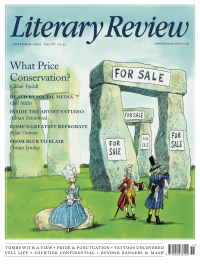J S Barnes
Second City Saga
Bournville
By Jonathan Coe
Viking 354pp £20
As a tutor in creative writing, I am often approached by would-be novelists who intend to base a story on some element of their family history. On such occasions, I try to be respectful while also suggesting gently that what is fascinating to the aspiring writer may not carry quite the same charge of interest to those who do not share their DNA.
Jonathan Coe – author of more than a dozen lauded novels – is far from being a neophyte, but one wonders whether someone at his publisher ought not to have made a similar point. They have done his reputation few favours by publishing his new book, Bournville.
The novel’s heroine is Mary Lamb, whom we first meet as an eleven-year-old in 1945 and whose eventual death we witness in 2020. She is not always the focus of the narrative, however. Coe is unafraid of shifting the point of view, meaning that we get to see at close quarters not only Mary herself but also many members of her family, from her complicated husband to her closeted son to her musician granddaughter. As the title suggests, much of the action is concentrated in the Birmingham suburb of Bournville. We watch the lives of Mary and the rest scroll by against a backdrop of national events – V-E Day, the 1966 World Cup, the death of the Princess of Wales and so on.
Coe has based Mary on his own mother, and it should be stated that the section which deals with her death (narrated in the first person by one of her sons) is profoundly moving, filled with righteous anger at its circumstances: in the midst of lockdown, the final

Sign Up to our newsletter
Receive free articles, highlights from the archive, news, details of prizes, and much more.@Lit_Review
Follow Literary Review on Twitter
Twitter Feed
Though Jean-Michel Basquiat was a sensation in his lifetime, it was thirty years after his death that one of his pieces fetched a record price of $110.5 million.
Stephen Smith explores the artist's starry afterlife.
Stephen Smith - Paint Fast, Die Young
Stephen Smith: Paint Fast, Die Young - Jean-Michel Basquiat: The Making of an Icon by Doug Woodham
literaryreview.co.uk
15th-century news transmission was a slow business, reliant on horses and ships. As the centuries passed, though, mass newspapers and faster transport sped things up.
John Adamson examines how this evolution changed Europe.
John Adamson - Hold the Front Page
John Adamson: Hold the Front Page - The Great Exchange: Making the News in Early Modern Europe by Joad Raymond Wren
literaryreview.co.uk
"Every page of "Killing the Dead" bursts with fresh insights and deliciously gory details. And, like all the best vampires, it’ll come back to haunt you long after you think you’re done."
✍️My review of John Blair's new book for @Lit_Review
Alexander Lee - Dead Men Walking
Alexander Lee: Dead Men Walking - Killing the Dead: Vampire Epidemics from Mesopotamia to the New World by John Blair
literaryreview.co.uk